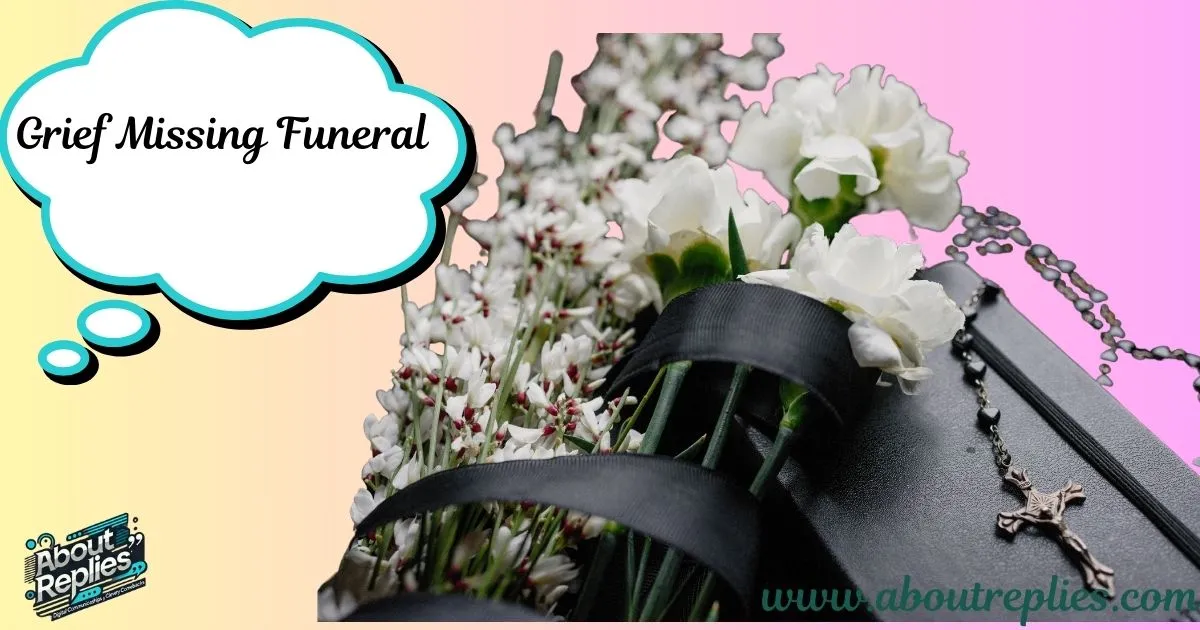“Coping with Grief When You Miss a Funeral: How to Offer Support and Comfort from Afar.”
Losing a loved one is one of the most painful experiences anyone can go through. The grief that comes with it can be overwhelming, and the feeling of missing the funeral only adds to the emotional burden. Coping with grief after missing a funeral can be difficult, especially when you feel you have missed an important moment to say goodbye.
It’s normal to feel a sense of guilt, confusion, and sadness, but it’s crucial to understand that there are ways to manage these feelings and heal.
If you find yourself struggling after missing a funeral, don’t stay silent. Reach out to friends, family, or a support group. There are ways to express your emotions, remember your loved one, and cope with the grief you’re feeling. Take small steps towards finding peace, and know that healing is a journey that doesn’t have to be taken alone. You can still honor the memory of the deceased, even if you weren’t able to be there in person.
This article will guide you through ways to cope with grief after missing a funeral. From expressing sincere condolences to offering support to others, we’ll cover practical steps and emotional strategies that can help. It’s okay to grieve in your own time and space, and by following these tips, you can begin to heal and find comfort.
Expressing Sincere Condolences
- Write a Personal Sympathy Note – Share heartfelt words to express your sorrow and let them know you are thinking of them.
- Acknowledge Their Loss – Mention the specific loss they have endured and the impact it must have had on their lives.
- Mention the Deceased’s Positive Traits – Share specific qualities that made the deceased special to you, such as their kindness or sense of humor.
- Offer Your Support – Let them know you are available for emotional support, listening, or offering practical help.
- Send Flowers or Gifts – Consider sending flowers or a small gift to show you are thinking of them during this tough time.
- Mention Special Memories – Share a specific memory that highlights the unique connection you had with the deceased.
- Express Empathy and Understanding – Let them know you understand their pain, and offer comfort during their grief.
- Avoid Minimizing Their Grief – Acknowledge that everyone grieves in their own way and avoid offering solutions to their sorrow.
- Be Sincere in Your Words – Make sure your message feels genuine and not rushed or robotic.
- Include a Closing Statement of Support – Close with words like “I am here for you” or “You are in my thoughts and prayers.”
Read more: Funny Ways to Say I Love You(2025)
Acknowledging Your Absence
- Express Regret for Not Attending – Start by acknowledging your absence and expressing how sorry you are for not being there.
- Explain Your Reasons Politely – Without over-apologizing, briefly explain why you couldn’t attend the funeral (e.g., distance, prior commitments).
- Offer Emotional Support – Let them know that while you couldn’t be there physically, your thoughts and emotions were with them.
- Share Your Feelings of Loss – Express that you also feel the absence of the deceased and that their loss is felt by many.
- Offer to Visit or Call Later – Suggest that you are available to check in with them or visit once they’re ready.
- Send a Card or Message – Consider sending a card with a personal note explaining your absence.
- Avoid Over-Justifying – Keep the explanation simple; avoid going into too many details or making excuses.
- Apologize Genuinely – A sincere apology can go a long way in showing you care about their feelings and their loss.
- Follow Up – A few days or weeks later, follow up to see how they’re doing and if they need any support.
- Respect Their Emotions – Understand that they may feel disappointed but offer compassion and understanding.
Offering Support and Assistance
- Offer Practical Help – Offer to assist with household chores, grocery shopping, or other practical tasks that might be difficult for them.
- Check In Regularly – Send messages or make calls to see how they are coping and if they need anything.
- Offer Emotional Support – Sometimes just being there to listen without offering advice can mean the world to someone grieving.
- Encourage Them to Talk About Their Loss – Invite them to share memories or stories about their loved one.
- Provide Transportation Assistance – Offer rides to appointments, stores, or other places they may need to go.
- Cook Meals or Offer to Deliver Food – Prepare and deliver a meal to help take some pressure off the grieving family.
- Offer to Run Errands – Help with errands like picking up prescriptions, mail, or other everyday tasks.
- Give Them Space When Needed – Recognize when they need space and let them know that you’re available if they need support later.
- Offer to Help with Funeral Arrangements – If they need assistance, offer help in organizing or coordinating funeral details.
- Support Financially if Appropriate – If possible, contribute to funeral costs or help in other financial ways without being intrusive.
Sharing Memories and Celebrating Life
- Create a Memory Book – Collect photos, letters, and memories to create a tribute to the deceased’s life.

- Host a Virtual Memorial – Set up a virtual gathering to share stories, memories, and to celebrate the deceased’s life with others.
- Encourage Others to Share Memories – Invite others to share their stories or memories, either through social media or in person.
- Create a Tribute Video – Compile clips or photos to create a video that celebrates the deceased’s life and legacy.
- Start a Fund or Charity in Their Name – Set up a charity or fund in the deceased’s honor as a lasting legacy.
- Plant a Tree or Flower in Their Memory – A lasting tribute like planting something in their memory can be very meaningful.
- Host a Memorial Gathering or Celebration of Life – If appropriate, host a gathering that focuses on celebrating their life rather than focusing solely on the grief.
- Light a Candle or Hold a Moment of Silence – Take time to reflect on their life and the impact they had.
- Create a Personalized Memorial Item – Make or buy something special like a framed photo, a memorial ornament, or a custom item.
- Share Photos and Videos – Post pictures or videos that reflect the deceased’s personality or important moments in their life.
Expressing Ongoing Support
- Check In Regularly – Keep in touch in the weeks following the funeral to show that you’re still thinking of them.
- Send Cards or Letters – Send a handwritten note or card every so often to remind them they’re not alone.
- Offer Specific Help – Don’t just say “Let me know if you need anything,” offer specific ways you can help (e.g., “I’ll come over and help with groceries next week”).
- Attend Support Groups Together – If they feel open to it, suggest attending a grief support group to help them cope.
- Continue to Acknowledge Milestones – Be aware of anniversaries or important dates that may trigger more grief, and offer your support during those times.
- Send Small Gifts of Comfort – A thoughtful gift such as a book, blanket, or candle can provide comfort.
- Offer to Help with Long-Term Tasks – Help with things like financial matters, or long-term organizing after the initial shock of grief has passed.
- Be Patient – Understand that grief takes time and may ebb and flow, so be patient as the grieving person navigates their emotions.
- Invite Them to Events – Invite them to social events, but give them the space to say no if they’re not ready.
- Respect Their Grieving Process – Everyone grieves differently, so always be respectful and non-judgmental of their process.
Acknowledging the Impact of the Deceased
- Speak About Their Legacy – Share how the deceased impacted your life and the lives of others in a meaningful way.
- Mention Their Values – Acknowledge the positive traits and values that they embodied throughout their life.
- Celebrate Their Accomplishments – Recognize the achievements and milestones that made the deceased special.
- Reflect on Their Impact on the Community – Mention how the deceased touched the lives of others, whether through kindness, service, or leadership.
- Honor Their Memory on Special Dates – On the anniversary of their passing or other important dates, acknowledge their memory and how they shaped your life.
- Create a Memorial Event – Plan an event that celebrates their life and brings together those they impacted.

- Offer a Tribute on Social Media – Post a respectful tribute to share with others who were close to the deceased.
- Donate to a Cause They Supported – Contribute to a charity or cause that was important to the deceased.
- Pass Down Their Wisdom – Share lessons they taught you, passing on their wisdom to future generations.
- Reflect on Their Influence in Your Life – Regularly take time to reflect on how the deceased continues to influence and inspire you.
Offering Words of Comfort
- Be Honest and Heartfelt – Speak from the heart, offering sincere and genuine words of comfort.
- Acknowledge Their Grief – Let them know you understand their pain and that it’s okay to feel sad, angry, or confused.
- Offer Reassurance – Remind them that they are not alone in their grief and that you are there for them.
- Share Comforting Scriptures or Quotes – If the person is religious, offer comforting scriptures or meaningful quotes.
- Avoid Offering Unsolicited Advice – Instead of telling them how to grieve, simply offer comfort and understanding.
- Let Them Know It’s Okay to Cry – Remind them that expressing their emotions is a natural part of the healing process.
- Encourage Them to Remember the Good Times – Encourage the grieving person to focus on happy memories with the deceased.
- Avoid Cliché Phrases – Try not to use phrases like “They are in a better place” unless you know it will comfort them.
- Offer Silence if Needed – Sometimes, silence is more comforting than words, so be present with them.
- Remind Them of Your Support – Offer ongoing comfort by telling them you are available whenever they need you.
Few Tips for Expressing Condolences When You Can’t Attend a Funeral
- Send a Sympathy Card – A simple card can go a long way in expressing condolences when you can’t attend the funeral.
- Reach Out with a Phone Call or Video Chat – If possible, take a moment to call or even video chat to express your condolences.
- Write a Letter – Write a heartfelt letter expressing your sympathy and any fond memories of the deceased.
- Make a Donation to a Charity – Consider making a donation in memory of the deceased, particularly to a cause that they were passionate about.
- Send Flowers – Sending flowers is a traditional yet meaningful way to express sympathy when you cannot attend.
- Offer to Visit or Help in the Future – Let them know that you’re thinking of them and willing to visit when the time is right.
- Be Respectful of Their Grieving Process – Remember that grieving looks different for everyone, so respect their needs and timing.
- Join a Memorial Event or Virtual Service – If there’s a memorial event or virtual service, join to show your support.
- Respect Their Wishes – If they have requested no visitors or a private mourning period, respect those wishes while offering support in other ways.
- Avoid Overshadowing the Grief – While your condolences are important, avoid making the conversation too much about you. Focus on their grief.
How to Get Closure Without a Funeral
- Hold a private family gathering at home.
- Create a memory book with photos and stories.
- Plant a tree or garden in memory of the deceased.
- Write a personal letter to the loved one.
- Light a candle and reflect on their life.
- Host an informal celebration of life at a favorite location.
- Seek therapy or join a grief support group.
- Donate to a cause they cared about in their name.
- Compile a playlist of songs that remind you of them.
- Visit places that were meaningful to them.
No Funeral, Just Cremation
- Cremation offers simplicity and flexibility.
- Families can scatter ashes in meaningful locations.
- Cremation is often a cost-effective alternative.
- It allows families to decide on a memorial later.
- Cultural or personal beliefs may influence this choice.
- The focus shifts to intimate, non-traditional remembrances.
- Ashes can be stored, scattered, or used in keepsakes.
- Loved ones can hold informal ceremonies at their own pace.
No Funeral or Memorial Service
- Respecting the deceased’s wishes for simplicity.
- Avoiding large gatherings due to personal preferences.
- Financial constraints making it unfeasible.
- Focusing on private grieving rather than public events.
- Opting for alternative ways to honor the deceased.
- Reducing stress and logistical challenges for the family.
- Holding a virtual tribute instead of in-person events.
- Planning a memorial at a later date, if desired.
What Happens to a Body If There Is No Funeral
- The body is handled by a funeral home or crematory.
- Families may choose direct cremation or burial.
- The body is prepared according to legal requirements.
- Cremated remains are returned to the family.
- Without a funeral, no formal public viewing occurs.
- Death certificates and legal documentation are processed.
- Ashes can be kept, scattered, or interred.
- If buried, a simple graveside ceremony might be optional.
Why Would Someone Not Want a Funeral
- Desire for privacy or simplicity.
- Financial concerns or limited resources.
- Discomfort with traditional funeral settings.
- Cultural or religious beliefs against funerals.
- Wishes of the deceased to avoid ceremonies.
- Focus on celebrating life rather than mourning.
- Distance or scheduling issues for family members.
- Preference for alternative ways to honor the deceased.
How to Say No Funeral in an Obituary
- “At the deceased’s request, there will be no funeral.”
- “No formal services will be held.”
- “The family will honor their wishes privately.”
- “A private cremation has taken place.”
- “A memorial may be planned at a later date.”
- “The family requests no gatherings or services.”
- “Celebration of life details will be shared separately.”
- “In lieu of a funeral, consider [specific action, like donating].”
No Funeral Records
- Some families may not register services formally.
- Direct cremations often don’t leave detailed records.
- Small, private gatherings may go undocumented.
- The deceased may not have planned a formal event.
- Lack of funeral records doesn’t mean no arrangements were made.
- Family members can still provide personal accounts.
- Legal documents like death certificates remain available.
- Obituaries might indicate arrangements in place of formal records.
Key Insight
1. What should I say to someone who is grieving but I can’t attend the funeral?
You can express your sympathy through a heartfelt message, offer support in practical ways, and let them know you’re thinking of them during this difficult time. A phone call, letter, or even a virtual meeting can show you care.
2. How can I support a friend who is grieving without being there physically?
You can support a friend emotionally by checking in regularly, offering to help with everyday tasks, or simply letting them know you’re available to listen. A thoughtful gesture like sending flowers or a card can also be comforting.
3. How do I acknowledge my absence at a funeral in a respectful way?
Acknowledge your absence by expressing your regret and briefly explaining why you couldn’t attend. Make sure to follow up with a supportive message or gesture that shows you care.
4. Can I send flowers if I can’t make it to the funeral?
Yes, sending flowers is a respectful and thoughtful way to express your sympathy when you cannot attend the funeral. It’s a traditional gesture that conveys your condolences.
5. How can I celebrate the life of someone who passed away if I missed the funeral?
You can celebrate their life by sharing memories, writing a tribute, creating a memory book, or donating to a cause they cared about. Holding a small gathering or lighting a candle in their memory can also be meaningful.
Wrap-Up
Losing someone close to you is always a challenging experience, and not being able to attend the funeral can leave you feeling helpless. However, there are still many ways to offer your condolences and support from afar. Through thoughtful messages, acts of kindness, or remembering the deceased’s legacy, your presence can still be felt. It’s important to reach out in meaningful ways, even if you’re physically distant.
Grieving doesn’t have a timeline, and your ongoing support, even after the funeral, can be a tremendous source of comfort to those who are mourning. Show compassion, be patient, and remind your loved ones that you are there for them through their grief journey.

Hi! I’m Ethan Matthews – Known for my sharp sense of humor, I specialize in crafting funny responses that keep the conversation lighthearted. Join me for the best comebacks and witty replies!

